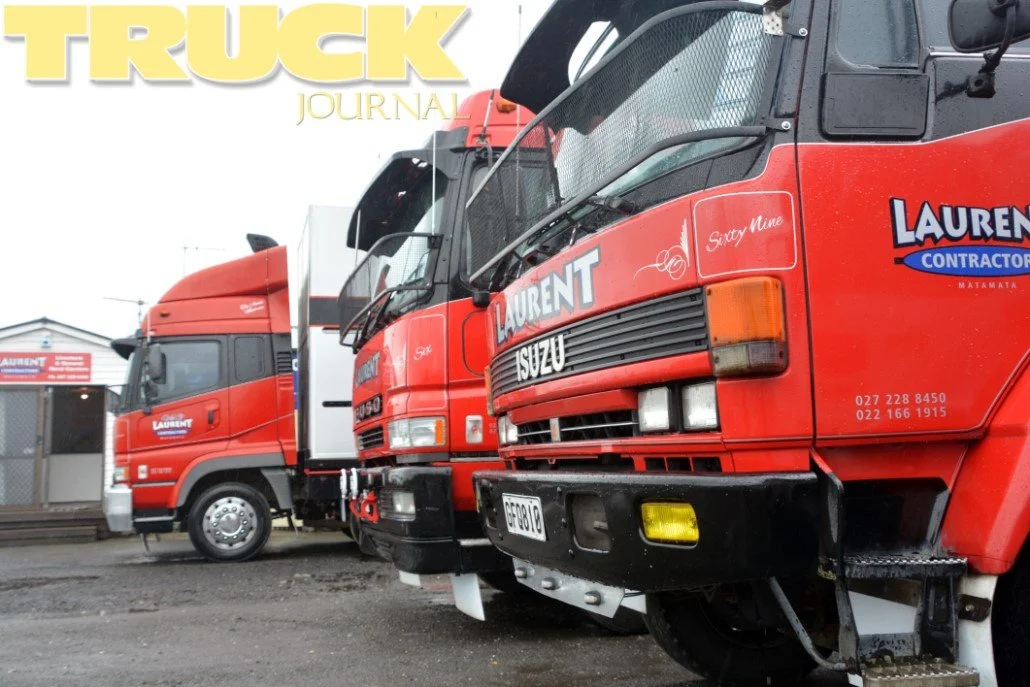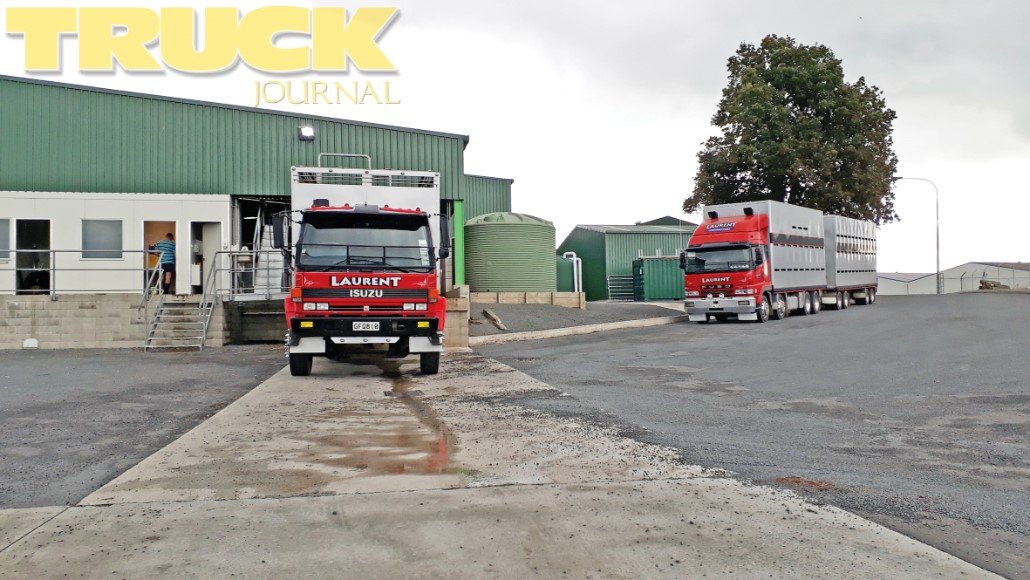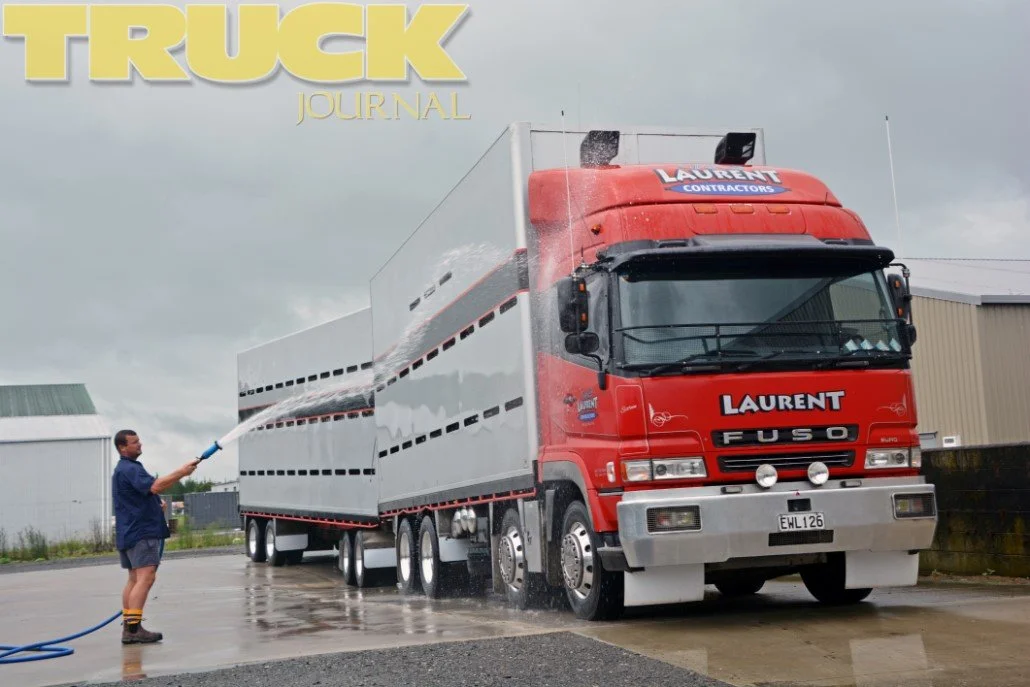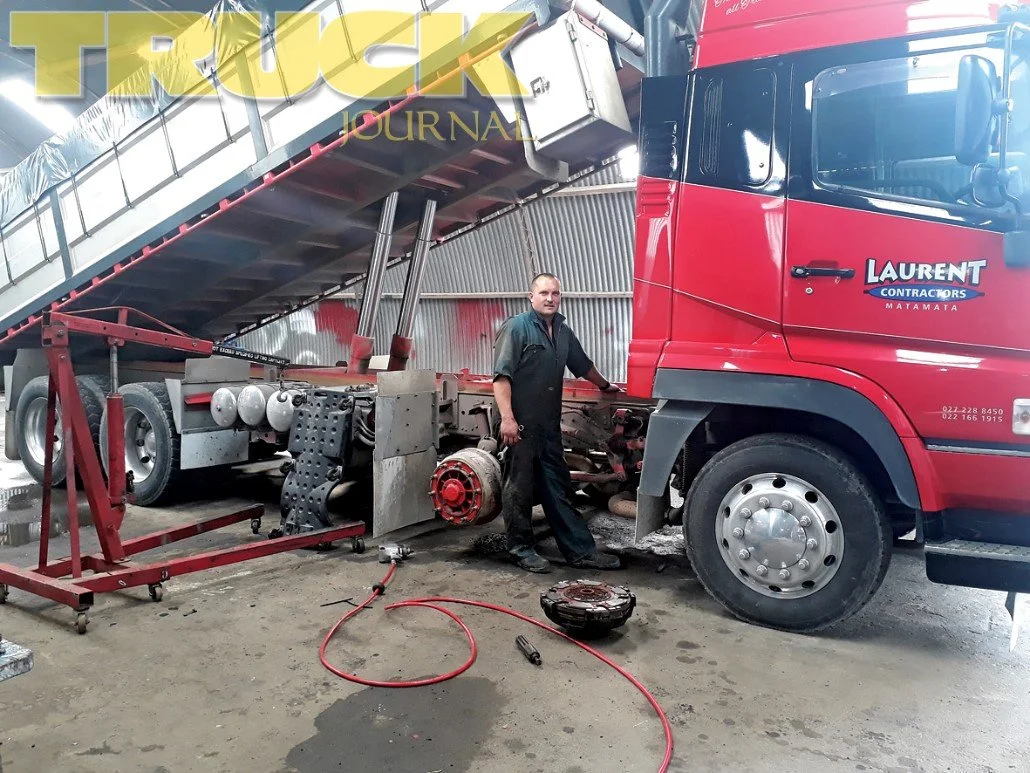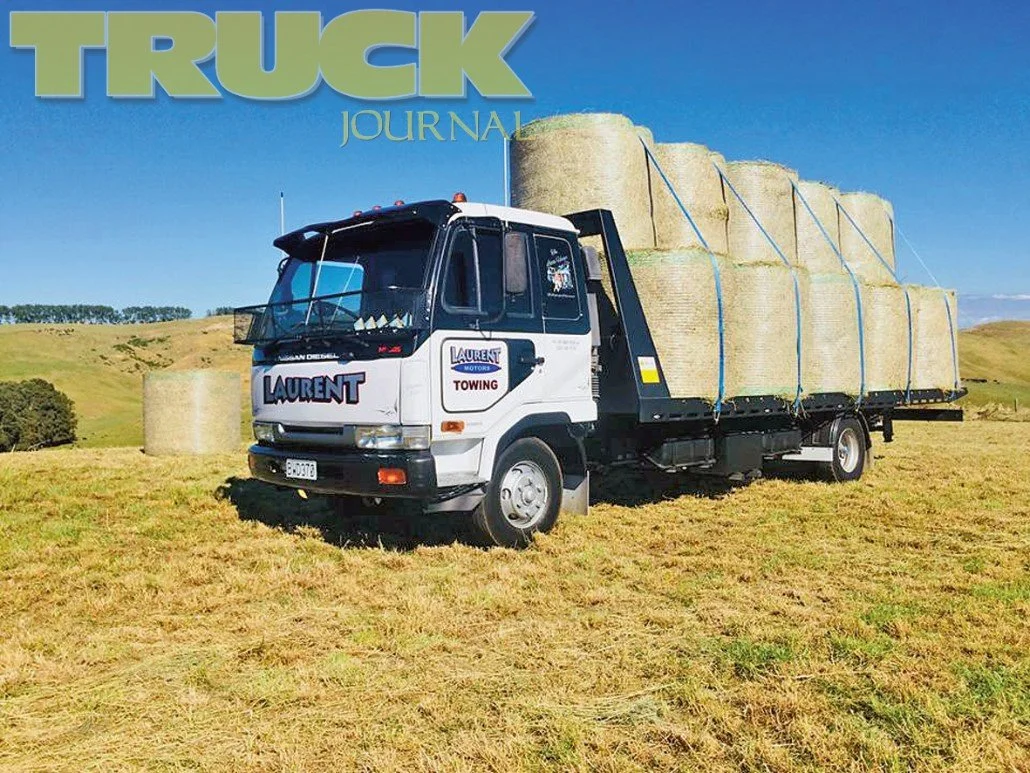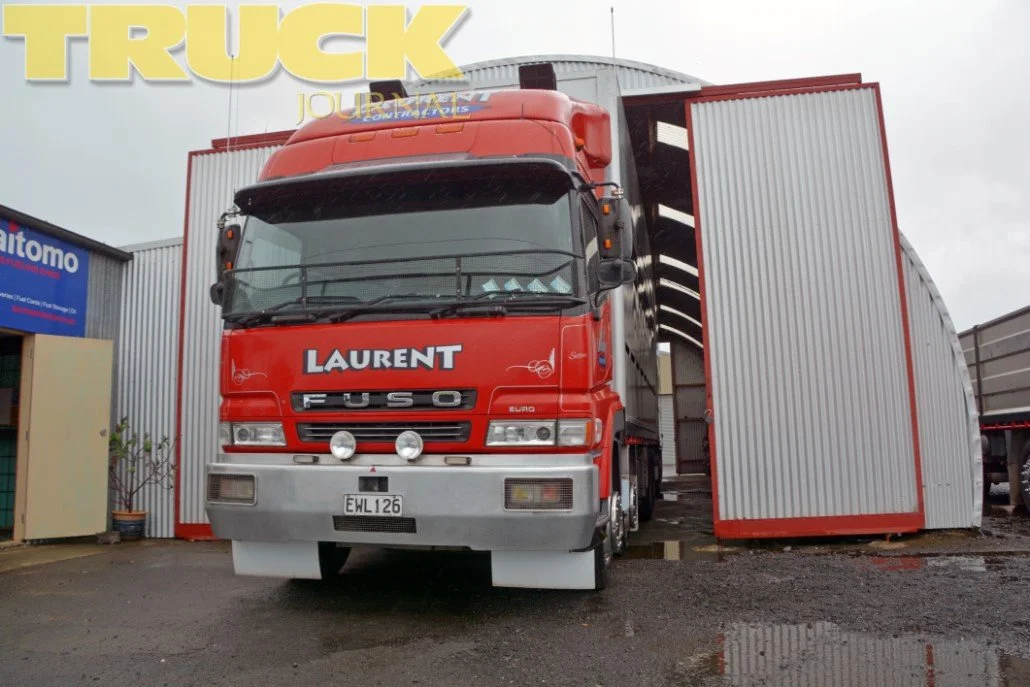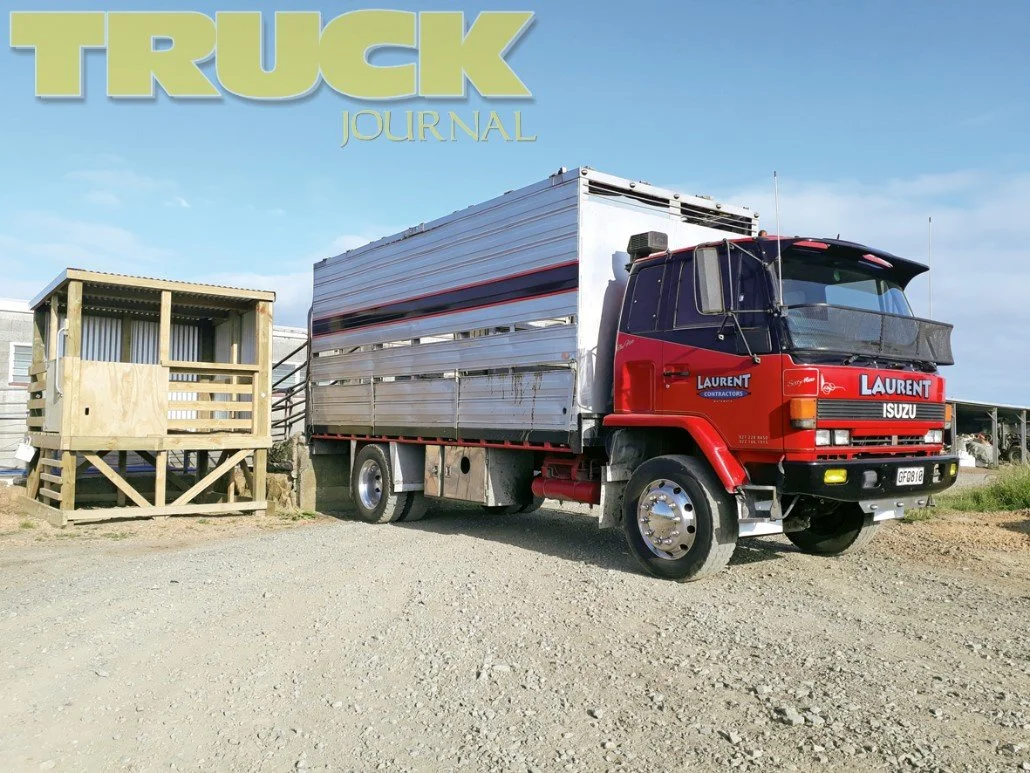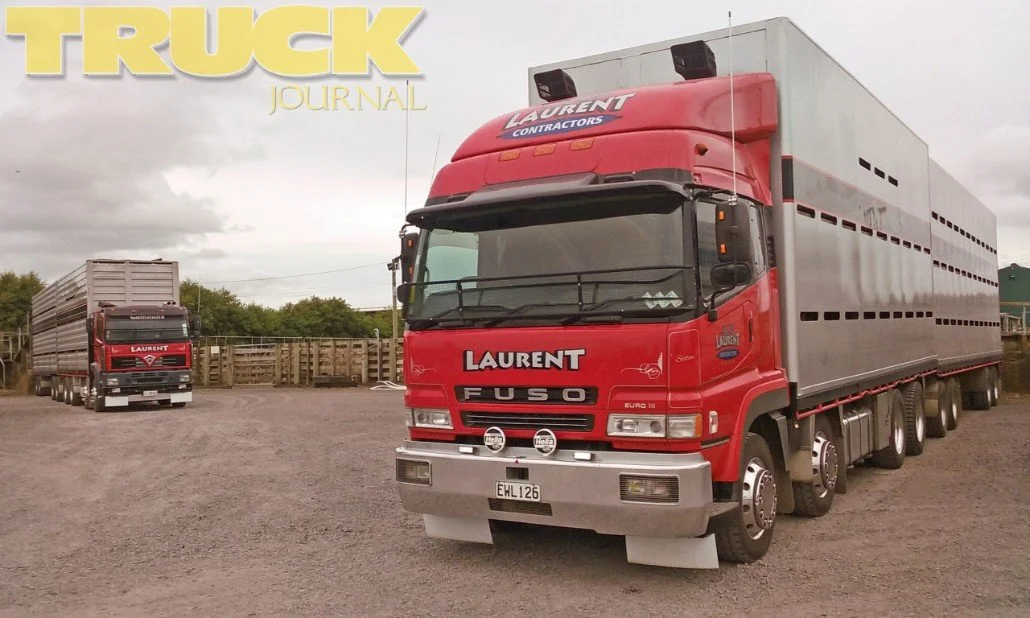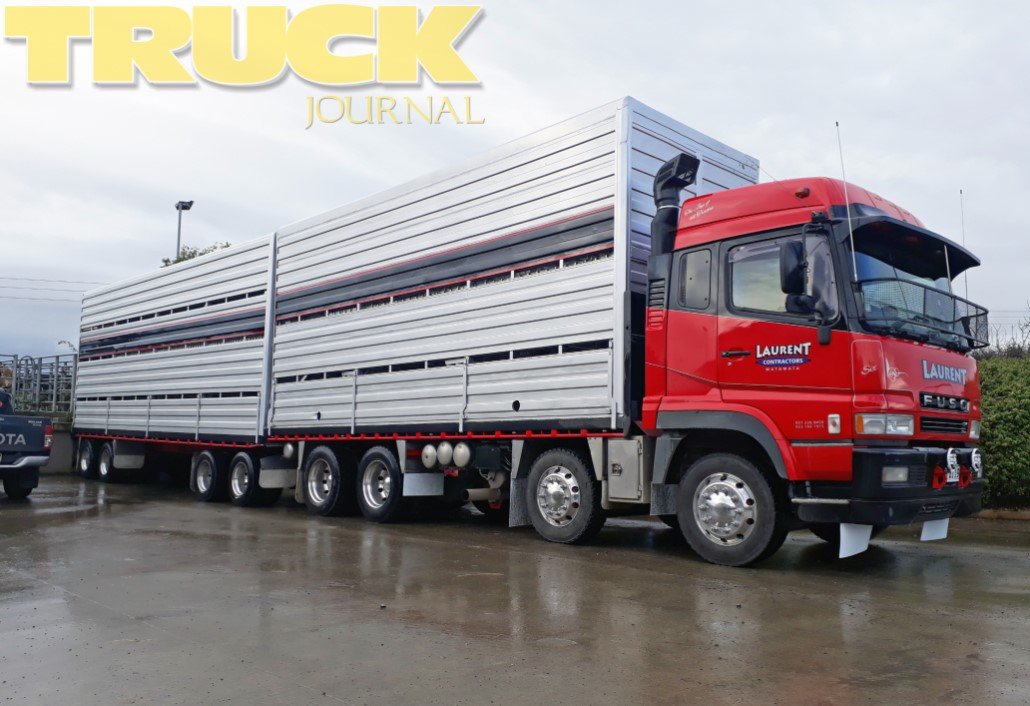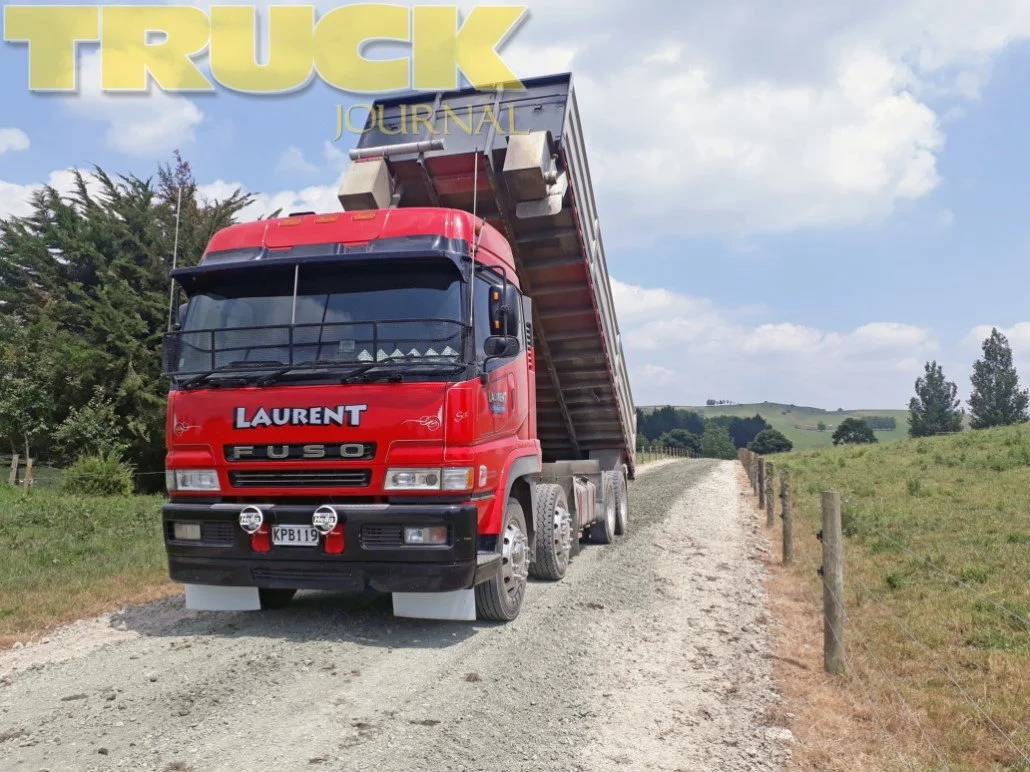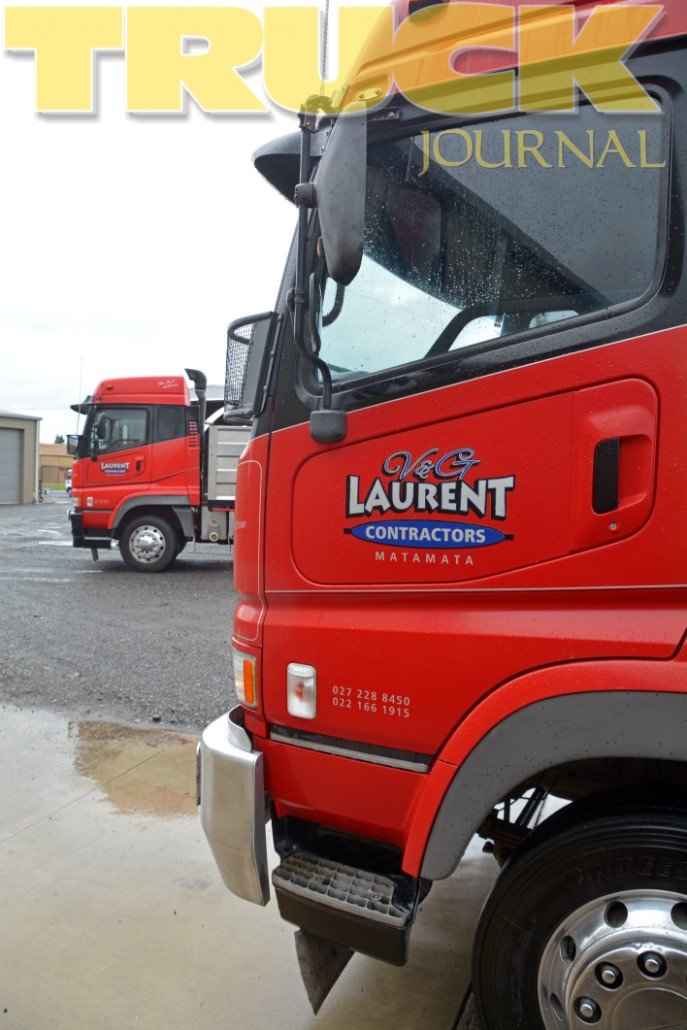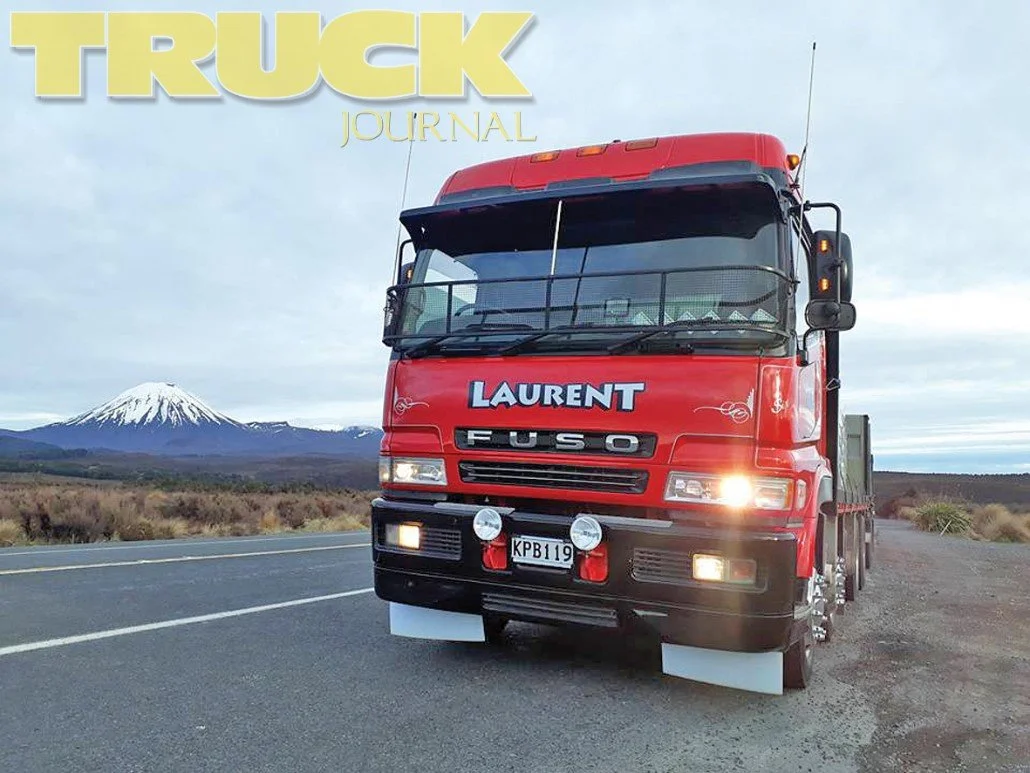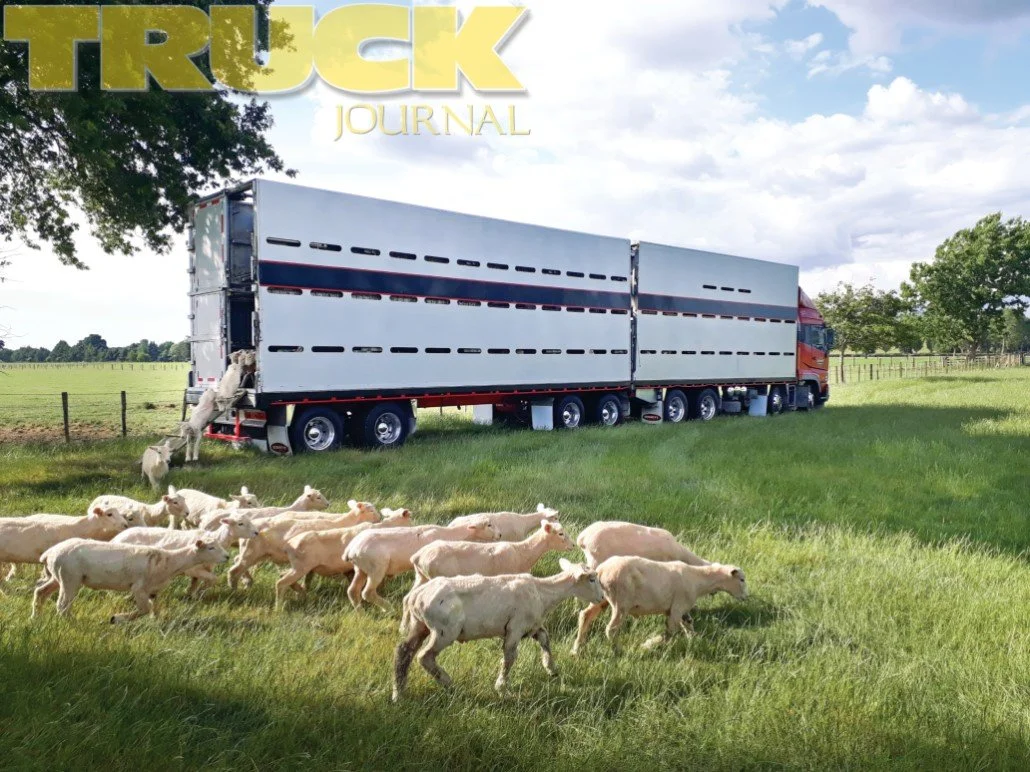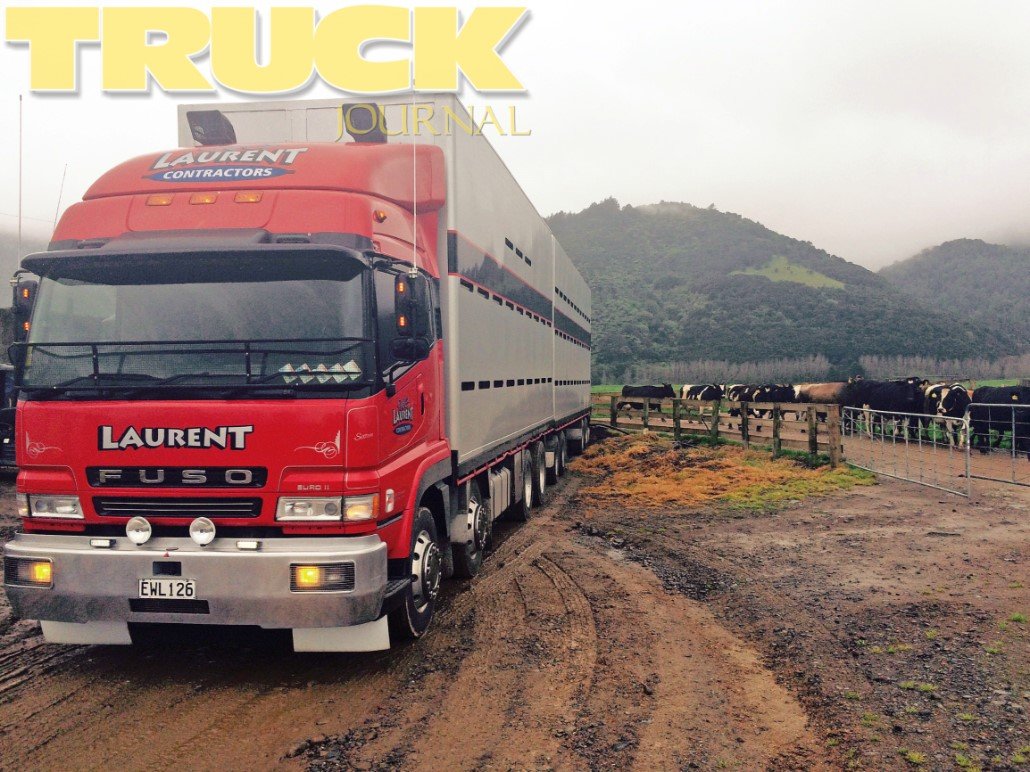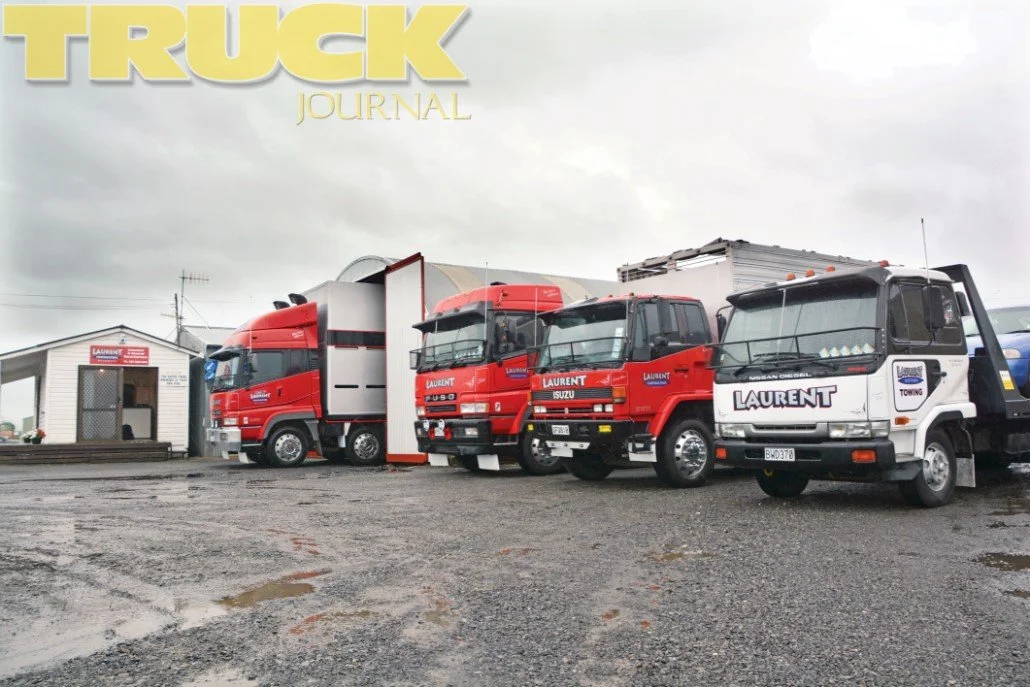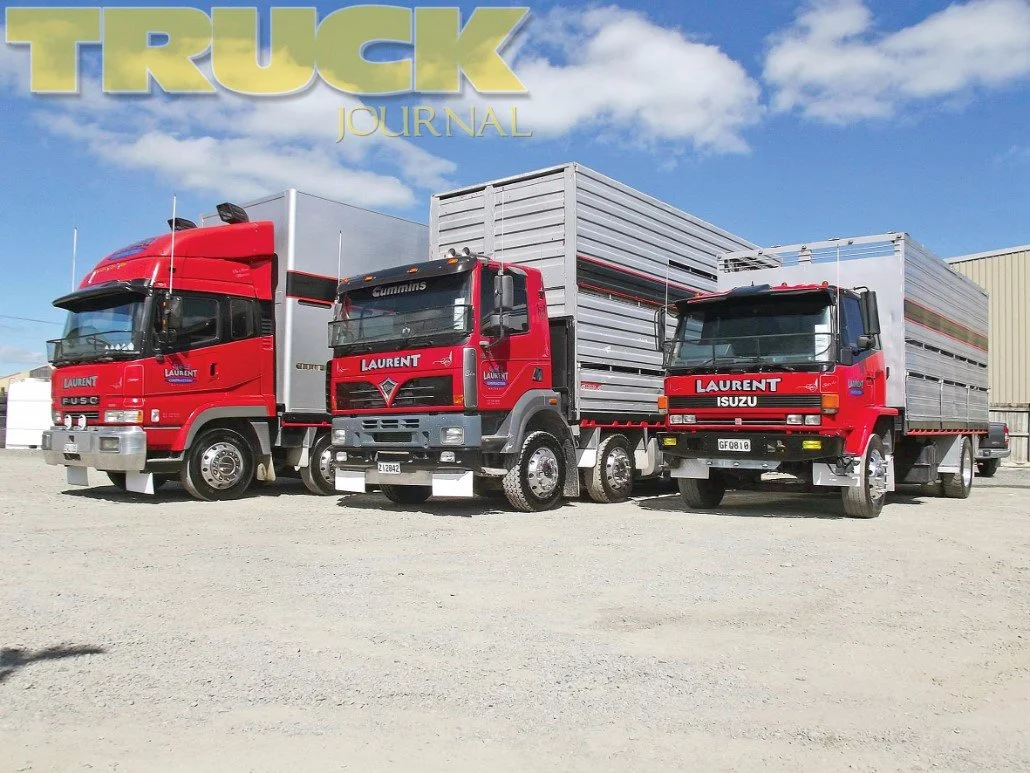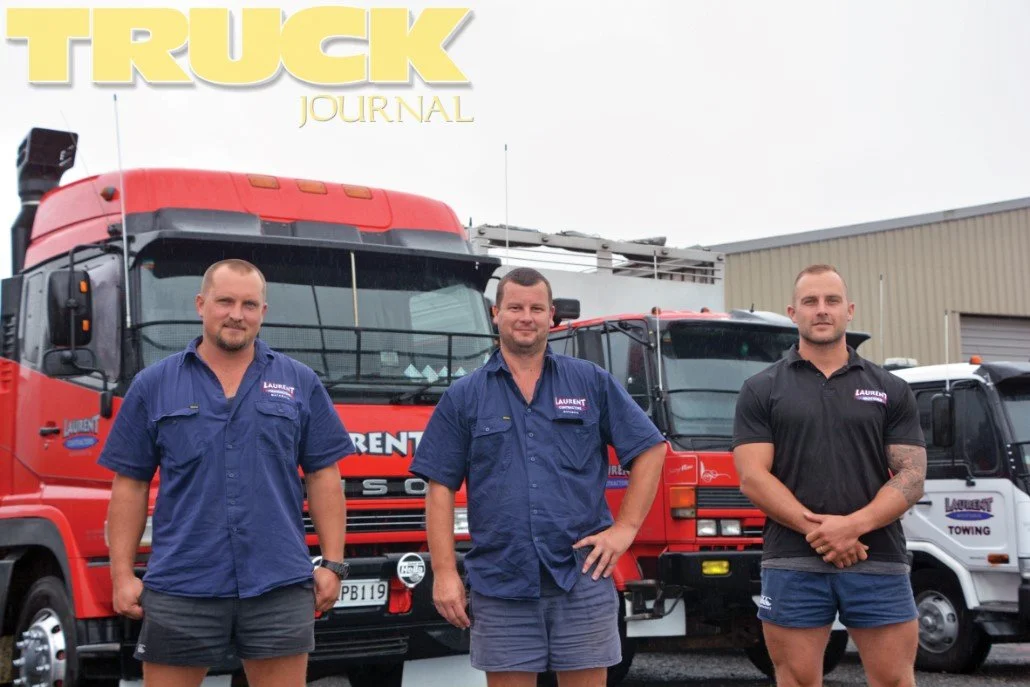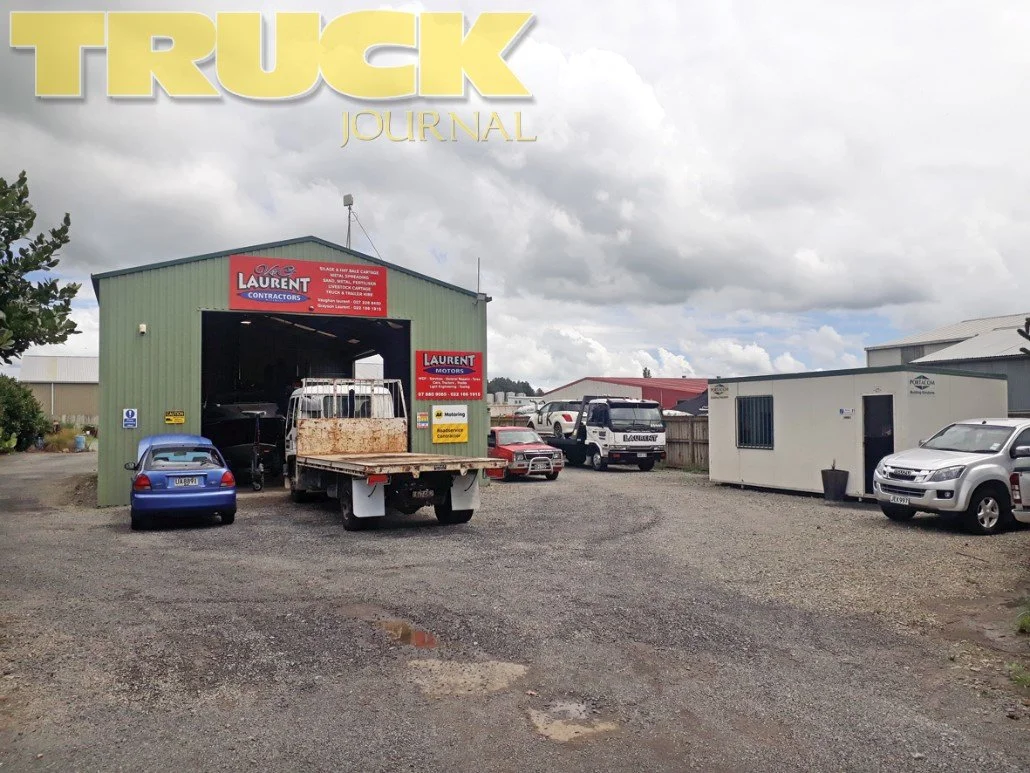Laurent Contractors Ltd -The new face of the industry
The Laurent boys have been building up a clean sharp looking small fleet.
Article first published May 2018
When we look at the transport industry and its aging work force it is not hard to realise the problems that this is now presenting and the far-reaching implications it will have. So, when we were asked to visit a transport company run by some keen young men, how could we refuse? Laurent Contractors Ltd, Waharoa is owned and operated by Vaughan and Grayson Laurent alongside their wives Dani and Larissa. These young people epitomise the young face of transport, yet they are also some of the few taking the reins in the punishing world of road transport. Simon Vincent went to the Waikato to find out first hand just what drives these hardworking young people.
Brothers, Vaughan (31) and Grayson (27) Laurent are hardly the typical face of the transport industry. They stand out for both their youth and their passion for trucking.
Laurent’s front line trucks are a pair of late model Fusos.
Both of the boys are mechanics by trade, yet both were drawn to trucks and trucking from a very young age.
With a family history revolving around a workshop, when growing up these young men were exposed to the realities of hard work, long hours and the success it can bring. Their father ran a garage and service station on State Highway 27 and, as boys, the brothers would drive the cars, utes, tractors and trucks around the yard as they helped their dad.
The yard flea unloading at a meat processing plant.
Vaughan says, “Driving trucks was something I always wanted to do.” After completing his apprenticeship, he found his way behind the wheel and for the past 11 years hasn’t looked back.
Brother Grayson followed a similar route becoming a mechanic. Then, finding work as a mechanic driver, he was able to climb the graduated licence path and find work in the trucking industry.
The Foden Alpha with a Fuso loading at a farm.
Three years ago, the brothers decided it was time to strike out on their own and give it a go for themselves.
“We started with literally nothing, no business, one truck and a whole power of enthusiasm and determination,” they say. Vaughan talked about how the bank manger succinctly said with no contracts and a ream of issues in front of them he was taking a bit of a gamble. However, it was their straight talking, hardworking ethos and their in-depth knowledge of the industry that swayed him, they said.
Jock Temm washing his Fuso stock unit.
Being seen working on a truck on the side of the road at 1am didn’t hurt their case either.
Vaughan reflects that they’ve come a long way since then.
To get the business established Grayson drove the firm’s first truck, a Foden Alpha, solidly for the first six or so months whilst Vaughan utilised the time working out of the back of his ute as a mobile contract mechanic. When necessary, he hopped into the truck seat at night or on weekends to ensure they could meet the expectations of their small but growing client base.
Laurent’s Foden loading maize silage of a chopper.
Initially they did quite a bit of sub-contracting to Mike Mathieson at Nationwide Livestock Ltd. The relationship with Mike continues to this day. However, the business is now much more of a reciprocal nature with the two companies helping each other out as and when needed.
“He (Mike) helped us out a lot. If it wasn’t for those first six months with him, it would have been hard to get rolling,” says Vaughan.
They were also fortunate with the busy and substantial maize harvest which came along early in the piece. Grayson reckoned that also “helped them out heaps”.
The flea making a dollar picking up stock from a local farm.
Whilst livestock cartage was, and remains, a major part of the rural cartage operation it is all part of a bigger picture, which is to service the local farming community in the best way possible. They remain keen to do as much as possible for their farmer clients, from freight and bulk commodities, to spreading metal and stock cartage, they can even fix their customers’ vehicles.
“Cockies like to know they can ring you and you’ll find the solution,” Vaughan says.
Vaughan getting his hands dirty in the workshop.
With a few good months behind them the brothers continued to grow from that standing start. They advertised locally, canvassed farmers around the district and started picking up more work. That process is ongoing and it’s still bringing in more work now, according to Vaughan.
The retail workshop tow truck doing a turn picking up round bales.
Being locals has helped immensely because they were well known. Together they had worked for many of the locals or worked with them in the past and this has led to them being able to forge good relationships with customers and other carriers.
The Foden Alpha proved to be a great choice to begin with. The twin ram underbody tipping truck could be used to fulfil the multitude of tasks required from bulk tipping and silage to stock cartage.
It was a good truck Grayson says.
With work building up the pair were able to purchase a second truck.
Fuso has been a firm favourite with the brothers.
To get started the brothers have had to rely on second hand gear. Vaughan is well aware of the limitations this places on the business. “Someone else gets the best out of them,” he acknowledges.
The Isuzu four wheeler is beautifully presented right down to the inclusion of alloy wheels.
“By the time you’ve paid them off they are pushing the million-kilometre mark” and then there is the prospect of major maintenance issues.
That is why they have chosen to go down the new truck path. They can make a good profit out of the truck for a number of years after it’s paid off and before it needs replacing.
“Once we get that new one, we’ll be at a good spot, and won’t need anything for a while,” Vaughan asserts.
Loading out of a bulk store.
His wife, Dani however reckoned they were famous last words, something she’s well used to hearing.
Vaughan and Grayson have purchased a DAF XF105 which is due to arrive in September… laughing as they say that. Getting the truck on the road and finished is turning into a long process which is being hamstrung by huge demand and growing lead times at trailer builders and stock crate manufacturers.
Two of the trucks loading out of a stock yard.
“You wouldn’t want a truck in a hurry,” Grayson says.
The only way you can get a truck on the road in a hurry is if you can find one second hand they say.
They believe that a solid, reliable, front line truck is necessary for the distance stock work. You can’t have stock stuck on a broken-down truck.
For the short haul and bulk tipping work which isn’t time sensitive, second hand trucks are perfectly suitable, they believe.
We struggle with two units and frequently require a third unit says Vaughan who is going to take over (company driver) Jock’s Fuso.
When it came to painting the fleet, the Foden arrived in red, so red became the default fleet colour. Lack of money in those early days meant they couldn’t afford a repaint. The original Foden red stretches back to its first owner, Kapuka Transport in Southland. However, the more recent additions have been painted (in house again to save money) with a brighter shade of red.
The brothers have managed to secure some contract work with some of the freezing companies. They have regular bobby calf runs each year and have been involved in the up and coming dairy goat industry. With around 47 goat farms dotted around the district, the need for the humane disposal of their kid goats has increased dramatically, especially in the wake of the bobby calf scandal. Now they also run a kid goat service, the kid goats being much easier to handle as they weigh only 11 or 12kg each.
A spin off of this is the new meat market for milk fed goat meat which is marketed as Cabrito.
Today, the business is based out of the former Waharoa Livestock yard on the industrial outskirts of Waharoa. Vaughan has taken over the running of the trucking operation, which he handles from the driver’s seat. He has been driving the firms Isuzu but will be taking over Jocks Fuso when the new truck arrives. Vaughan also fills in driving for either of the two driver’s, Jock or Brad, as required.
In a reversal of roles, Grayson is now back on the tools running a general mechanical workshop just around the corner from the yard. The mechanical business, Laurent Motors, services cars, utes, farm machinery and light trucks (under around 10 tonne) for the local community.
The Alpha building up a farm track.
The mechanical business was previously run by their father and can trace its roots back to the G.A.S Hinuera service station on the corner of State Highways 27 and 29. Their father sold the service station after 30 years of ownership and moved the workshop to Waharoa.
At the beginning of 2017 the boys bought out their father and Grayson took up the challenge of running the workshop. Grayson’s wife Larissa looks after the workshop paperwork.
To deliver the best possible service a tow truck was procured from Southland and arrived last July. The tow truck’s main work is collecting and returning repair jobs in addition to contracting to the AA as part of their roadside assistance program. The tow truck certainly covers some ground having been as far away as Dargaville and Palmerston North.
The Fuso spreading a farm track.
It also gets roped in to assisting the transport at times.
Having Grayson in the workshop gives the firm additional flexibility as they can call on him to drive if they are short which adds flexibility to the trucking operation.
“I still like to jump in them (trucks),” Grayson says.
The other benefit is having the services of a full qualified mechanic on hand at a moment’s notice if any pesky mechanical issues crop up.
It is the intention of Vaughan and Grayson to see the business remain at a manageable level. Vaughan says, “You don’t want to get too big, that’s when you have a lot of problems with employing staff and what not. We would like to grow a little bit bigger to look after ourselves and our area. The way we are going, it’s slowly building.”
He would rather have fewer trucks but keep those trucks busier which will allow for the quieter periods such as the winter when work can taper off. Unlike the freight industry, rural cartage doesn’t have regular contracts in place. As a rural carrier the next job comes when the phone rings. You wouldn’t know on a Friday what you’re doing come Monday but then on Sunday you might have more work than you can handle.
Asked what the biggest challenges the business faces, paper work and Health and Safety are first to be mentioned.
Whilst Vaughn may not agree with all the rules and regulations that surround the industry he does appreciate that they are there for a reason and to get ahead in business they need to be obeyed.
“A lot of it is shit,” he says, “but you’ve got to do that, cause everyone else has to do it and if you don’t do it you’ll get left behind.”
Jock says that there’s less red tape around the stock side of the industry compared to some sectors. Getting onto sites and taking people (and children) is easier he reckons.
“They’ve kind of left us alone a bit because we’re in the too hard basket,” Vaughan agreed.
However, the team realises that this will not last.
Making a mile through the centre of the North Island.
Vaughan and Dani’s kids spend plenty of time around the yard. They are most happy for them to be in the truck with him on weekends. He’s a big supporter of having kids around the yard so they can learn about work. Freezing companies have yet to exclude visitors, provided they remain in the vehicle at all times, which is definitely helping at this stage. Brad also takes his daughter at times.
When you’re doing long hours how else did you see your kids?
His eldest son, Rayden, has done the odd overnighter sleeping happily in the back of the cab.
No ramp, no problem, just jump the sheep off…
Vaughan pointed out that they are in the process of updating their Health and Safety policies. He can see the day when well established existing practices will be consigned to history and additional safety devices will have to be added to their trucks to meet best practice requirements.
Dani believes the main challenge is getting by month after month, with work fluctuating, a common problem for this type of operation. “It’s not easy. If someone said it was easy they’d be lying,’ she says.
Vaughan admits it is hard to find good drivers locally. They employed a young driver, Brad, two years ago as a Class 2 driver. Since then they have trained him up and put him through his licences so today he is a competent Class 5 driver operating the drop side tipper.
“We’re in the process of trying to find another young guy to train up,” Vaughan says.
They have a very smart 1991 Isuzu FTR which they can start the newbie on.
“We need that extra truck and that extra person but it is hard trying to find the right guy that wants to work,” Vaughan said.
Loading up in cattle country.
“Stock’s a hard industry too, not everyone wants to do it,” he admits.
Working stock is more about the skill of the driver being a stockman, able to read and understand the stock and to work safely around them, not just a driver capable of getting the truck from the farm to the freezing works.
Everyone’s looking for drivers, they say. It doesn’t matter which part of the industry it is, everyone is looking for staff, especially the good keen ones.
“There are just no young people coming through,” Grayson muses.
The industry is “not promoted right or well” Vaughan believes.
“To be a part of this industry you’ve got to be keen and interested in it. If you’re not interested in it, you won’t make a good truck driver to start with.”
Increasing fleet sizes and has seen the growth in drivers only interested in collecting a pay check. They’re not interested in the trucks and trucking. However, they are part of the changing face of the industry. These guys are bums on seats with little desire to look after the gear or for washing and caring for their trucks.
With low wages and poor prospects during the 1990s and 2000s, the people who should now be filling the industry were discouraged from joining, it was only the really passionate who came through. This is now playing out with drivers in their fifties and sixties setting up for retirement and few younger drivers in their thirties and forties coming along.
Neither Grayson or Vaughan could name any of their friends or people they went to school with who have joined the transport industry. They all went off and became plumbers, builders or tradesmen.
“If young guys are willing to work, they can make good money now,” says Vaughan.
Paying someone $17-$18 an hour and they don’t look after the gear or the clients and a client can be lost.
“I’d rather pay good money and get a good operator. That’s why I’d like to get a young operator like Brad because you can train them your way.”
For Jock, working in small companies like the Laurent operations is ideal. “I prefer the small companies,” explaining that bigger companies can lose the personal touch he enjoys.
The same is true of the clients, with many of them preferring the smaller company where they know and trust the drivers and will ask if a specific driver is going to do their work.
He reckons, “that’s what makes this place better.”
Jock says he has noticed the decline in camaraderie out on the highway. Unlike in the 70s and 80s when everyone would stop and help a mate, these days everybody just drives by. He recalled an incident where he was taking some lambs to Takapau on a Sunday when still driving for Tony Gurnick of Waharoa Livestock. One of Progress Transport’s drivers had a flat tyre on the Napier Taupo Road at the effluent dump. Jock hopped out and gave the driver a hand. The driver was most appreciative and mentioned that another of the Progress drivers had just shot by on his way by without even batting an eyelid.
Similarly, one of Gordon Livestock’s trucks had been stuck at the intersection of State Highways 27 and 29 for two hours and not one truck had stopped to ask if everything was alright. When he had finished loading, Jock gave the driver a tow around to Weallans yard to get him off the road.
“It’s just like dog eat dog,” he says.
He is somewhat more complimentary of the stock industry which still retains a little bit of the solidarity, he says. Drivers will assist one another, especially helping out other drivers who still have a lot of work in front them.
“That makes the stock industry good,” he says.
The Laurent family has come a long way in the three short years they have been in business.
Asked if they would recommend others having a crack at starting their own business, Jock immediately jokes, “not around here.”
On a more serious note though, Vaughan says “definitely,” if guys are keen it’s a great business. Dani chipped in saying it’s much more rewarding working on your own. The hard work pays off eventually, she said.
Vaughan says they enjoy what they are doing, it’s almost like a hobby, quickly admitting that might be “sad to say”.
Trucking doesn’t have off days – it consumes your life, you’re not going to have time for anything else.
However, it’s a life style they love in an industry they are proud to be a part of.
The people
L-R: Vaughan Laurent, Jock Temm and Grayson Laurent
Vaughan Laurent
After attending school in Matamata, Vaughan went to work for an agricultural contractor driving tractors and other machinery in Te Aroha. He then took up an apprenticeship as a diesel mechanic in Matamata before moving north to Whangarei. He worked for his uncle, Glenn Lowther at Atlas Cranes for four years. Vaughan moved back to Matamata and worked in livestock for Gordon McKenzie before doing a stint with Chapman Onion Exports in Te Poi driving their Peterbilt.
Grayson Laurent
When Grayson had completed his time at school he went engineering for a couple of years. Sick of being cooped up in a little bay of a workshop, he did five years as a mechanical apprentice coming out as a fully qualified mechanic. He was taken on by Waharoa Livestock under Gordon McKenzie as a driver mechanic. Without any truck licences Grayson worked his way up from a wee two axle Hino to becoming a full Class 5 driver.
Dani Laurent
Like many of the women involved in transport, Dani fulfils that vital role of looking after the books, handling administrative tasks, dealing with Health and Safety and everything else that is thrown her way, as well as raising the couple’s young children Rayden, Tanner and Sefton. When the transport business began she remained employed outside of the business and looked after the paper work at night and on weekends. As the workload has increased she has been able to relinquish those outside jobs and focus exclusively on the firm and the family.
Driver – Brad Goldsbury
23 year old Brad is an ex farm boy who has been quietly taught the ins and outs of the industry.
Brad was started on the four wheeler flea and told he would have to do a year on the truck before they would consider moving him up. That gave Brad the opportunity to see all stock tasks from bobby calves, stock sales, goats, bulls, weaners and more. It gave him a good grounding in how the industry works and the differing requirements of the changing seasons.
When he started he didn’t know one end of a spanner from the other Vaughan says. Today he services and greases his own truck.
Driver – Jock Temm
Jock is the old hand around the place at 39. He has been trucking for 20 years and reckoned that when he started there were still plenty of people prepared to give it a go.
Jock began his career at J Swaps Contractors in Matamata.
To start with, he was required to work in all the quarries which meant he learned where everything was, a useful necessity once you became a driver. He was given a driver’s position and some months later asked for time off to go and sit his licence… He ended up driving on a long nose Volvo for the firm. When he started the business was a lot smaller with only about fifteen trucks.
After nine years he moved to Waharoa Livestock for three years under Tony Gurnick until Tony sold out. Jock moved to Chapmans in Te Poi for the next seven years.
Jock is being given the new DAF and jokes that it might come with a 10 years contract, when the truck is worn out he might be allowed to move on…
Grayson,with his wife Larissa, now spends his time running the company’s retail workshop from a site around the corner from the yard.

